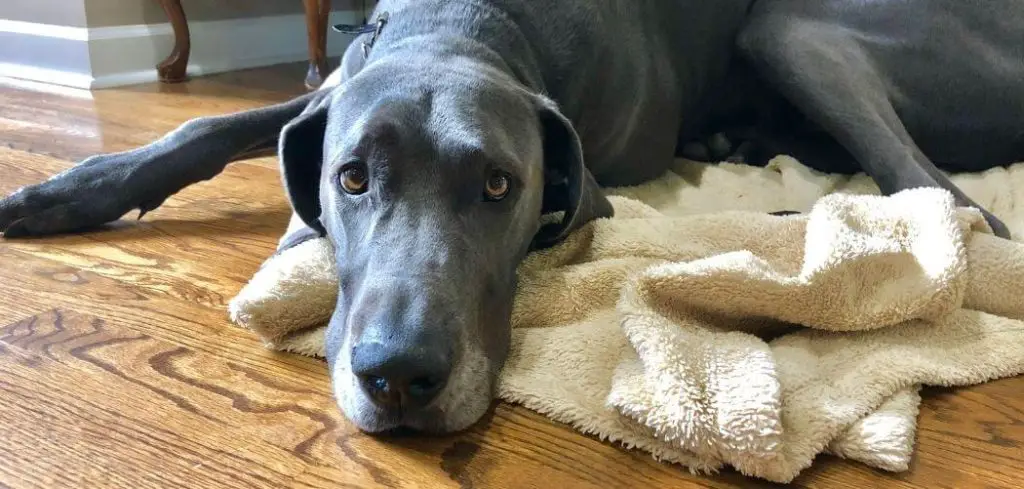It can be worrying to notice mucus in a dog’s stool, especially when it’s paired with diarrhea. While some mild digestive upsets can resolve on their own, these signs may also indicate something more serious.
We outline the possible causes of mucus in a dog’s poop and diarrhea, what you can do at home, and when to seek veterinary help.
Table of Contents
Mucus in Dog Poop and Diarrhea — Why It Happens
Mucus in stool and diarrhea in dogs often point to irritation or inflammation in the digestive tract. It may be caused by dietary issues, infections, parasites, or chronic conditions like colitis or inflammatory bowel disease. Stress, sudden food changes, or allergies can also play a role.
Sometimes, mucus is the body’s natural way of protecting the intestines, but when paired with loose stools, it’s usually a sign that something isn’t right.

Mucus in Dog Poop and Diarrhea: Possible Causes
Dietary Indiscretion
Dogs are curious eaters, and getting into trash, spoiled food, or table scraps can irritate their digestive tract.
This often leads to loose stools coated with mucus as the intestines attempt to flush out irritants.
Owners may also notice vomiting, gas, or decreased appetite. While mild cases may improve with rest and hydration, repeated or severe episodes need veterinary attention.
Read more: Mucus in Dog Poop and Vomiting (Causes explained)
Intestinal Parasites
Parasites like giardia, whipworms, and hookworms can cause mucus in stool along with persistent diarrhea. Dogs may lose weight, have bloated bellies, or become lethargic.
These infections are common in puppies and outdoor dogs. Left untreated, parasites can lead to malnutrition and severe dehydration.
Bacterial or Viral Infections
Infections such as salmonella, E. coli, or canine parvovirus irritate the intestines, causing diarrhea mixed with mucus. Affected dogs may also show fever, vomiting, and fatigue.
Parvovirus, in particular, is life-threatening, especially in unvaccinated puppies. Quick veterinary care is crucial when infections are suspected.
Colitis
Colitis, or inflammation of the colon, is a frequent cause of mucus in dog poop and diarrhea.
Dogs with colitis often strain to defecate and pass small amounts of loose stool mixed with clear or slimy mucus.
Stress, food intolerances, or chronic inflammation can trigger this condition. Some cases are short-lived, but recurring colitis may require long-term management.
Food Allergies or Intolerances
Some dogs develop digestive upset from specific proteins, grains, or additives in their food.
Diarrhea with mucus may occur after eating, often accompanied by itching, ear infections, or skin irritation.
Identifying the food trigger can take time, but switching to a hypoallergenic or limited-ingredient diet can bring relief.
Inflammatory Bowel Disease (IBD)
IBD is a chronic condition where the immune system overreacts to normal intestinal bacteria or food.
This ongoing inflammation leads to persistent diarrhea, mucus in the stool, and sometimes blood.
Dogs with IBD may lose weight despite eating normally. Since it’s a long-term condition, management usually involves dietary changes and medications prescribed by a veterinarian.
What to Do If Your Dog Has Mucus in Poop and Diarrhea
At home, it helps to first keep your dog hydrated, as diarrhea quickly leads to fluid loss.
Offering fresh water at all times is essential. In mild cases, withholding food for 12 hours before slowly reintroducing a bland diet of boiled chicken and rice may help calm the digestive system.
Monitor your dog closely for changes. If the symptoms improve within a day and no other concerning signs are present, it may have been a simple digestive upset.
However, continued episodes or worsening diarrhea signal a need for veterinary care.
Probiotics designed for dogs can support gut health, but always check with your vet before starting supplements. Avoid giving over-the-counter medications made for humans, as some can be toxic to dogs.
When to Call or Visit Your Vet
If your dog’s diarrhea with mucus lasts longer than 24–48 hours, it’s best to call your veterinarian.
Puppies, senior dogs, and those with underlying health issues are at higher risk for rapid dehydration and complications.
Seek immediate veterinary help if you notice blood in the stool, vomiting alongside diarrhea, refusal to eat or drink, or signs of severe lethargy. A fever, abdominal pain, or weight loss are also red flags. In these cases, prompt treatment can make a big difference.
For chronic or recurring mucus and diarrhea, your vet may recommend stool tests, bloodwork, or dietary trials to uncover the underlying cause.
Read more: Dog Diarrhea Mucus No Other Symptoms (What it means)
Key Takeaway
Mucus in dog poop with diarrhea is usually a sign of irritation or inflammation in the digestive system.
While mild cases may resolve with rest and careful monitoring, persistent or severe symptoms should never be ignored.
Providing hydration, a bland diet, and seeking veterinary guidance when needed are the best ways to keep your dog safe and healthy.
By paying attention to these signs early, you can help your dog recover quickly and avoid complications.
